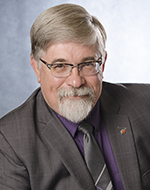Page Content
 The Alberta Teachers’ Association does not support the creation of a separate sex education curriculum for Catholic students but does support publicly funded Catholic education and the teaching of Catholic values alongside the program of studies.
The Alberta Teachers’ Association does not support the creation of a separate sex education curriculum for Catholic students but does support publicly funded Catholic education and the teaching of Catholic values alongside the program of studies.
That’s how ATA president Greg Jeffery described the Association’s position following recent news that a group of Catholic district superintendents had been planning to create a separate curriculum for sex education to be delivered in Catholic schools.
“Making a request for an alternate program of studies I think was somewhat beyond the bounds,” Jeffery said. “I found it to be quite divisive and it’s not how things work in Alberta.”
A document obtained by Postmedia through a freedom of information request suggested that the Council of Catholic School Superintendents of Alberta (CCSSA) had identified several potential “problematic” areas in which anticipated changes to the health curriculum could clash with church doctrine.
“We would be unable to teach any outcome requiring the promotion of homosexual relationships and/or lifestyles that are contrary to Church teaching,” the document says. “If the curriculum stipulates that we have to teach about ‘gender’ or ‘gender identity’ as disassociated from biological sex, then that would be problematic.”
The health curriculum is currently being rewritten as part of a systemwide over-haul of the province’s programs of studies.
In a release issued days after the news emerged, the CCSSA said it would focus on creating a resource that would complement the new curriculum rather than replace it.
“All potential human sexuality topics can be taught in Catholic schools, and authentically framed from the Catholic perspective. The CCSSA resource is intended to complement the prescribed Alberta Education wellness curriculum; it is not intended to replace the provincially mandated outcomes,” the release states.
For Jeffery, that distinction could make for a workable situation.
“That’s fair. Teaching the program of studies then teaching Catholic values beside it makes sense,” he said.
He noted that, last spring, delegates at the ATA’s Annual Representative Assembly passed two policies related to Catholic education. One policy urges Roman Catholic school boards to respect teachers’ rights “to exercise their individual professional judgment with regard to religious instruction and permeation of religion in the planning and teaching of lessons, evaluation of students, the selection of learning resources, and professional development.”
“In that sense, this resource should not be prescribed for Catholic teachers but it can certainly be offered as a resource to use in their classrooms,” Jeffery said.
The other policy affirms “the importance of constitutionally established denominational education” and supports “the legitimacy of denominational education provided by Roman Catholic separate school boards.”
“We believe in Catholic education,” Jeffery said. “We feel it has served Alberta very well and the model should continue.” ❚
